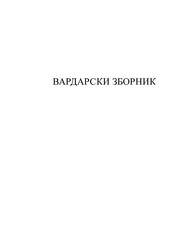Ђачка литерарна дружина „Дојчин” у Солуну и Скопљу, од 1903. до 1912. (Етнографска грађа у заоставштини Милоша Ивковића, I)
Literary School Club “Dojčin“ in Thessalonica and Skoplje 1903–1912
| dc.creator | Живковић-Христић, Зоран | |
| dc.date.accessioned | 2020-12-01T19:05:14Z | |
| dc.date.available | 2020-12-01T19:05:14Z | |
| dc.date.issued | 2012 | |
| dc.identifier.issn | 1450-8486 | |
| dc.identifier.uri | https://dais.sanu.ac.rs/123456789/9760 | |
| dc.description.abstract | Miloš Ivković, a Serb from Osijek, a student of Serbian and Slavonic Philology in Belgrade, a student of Aleksandar Belić graduated in 1906 and passed the teaching exam in 1911. He was teaching Serbian language and literature in the Grammar schools in Belgrade and Skoplje. He was appointed on 12th November 1913 a teacher of the Skoplje grammar school and he occupied the position till 10th July 1919. Upon his coming to Skoplje, he had found the already established Literary school club “Dojčin” which had been founded in the Thessalonica grammar school by the Serbian pupils from different Serbian territories under the rule of the Otoman Empire. The Club commenced its work in 1900, taking its name from the Thessalonica hero from the Serbian folk poetry, Bolani Dojčin, the cult of which was especially cherished among the pupils. In 1909 the Club transferred to the Skoplje grammar school. The pupils gathered on the meetings when they would discuss prepared papers and where they would be writing down the folk stories and poetry, both lyrical and epic, telling of places, folk customs and sagas; there were also papers of translations from the foreign literatures. The pupils would receive marks – reviews on these meetings. They would evaluate some papers, comment on them and suggest corrections. The marks served as a kind of reviews based on which the papers were published in the lithographic magazine which was edited by the pupils and read in the Grammar school. Ivković had, from his student days, been especially cherishing the interest for the linguistic studies and collecting of the ethnographic material which he studied. This is why the papers of the pupils of the Club “Dojčin” were interesting to him. On his return from Skoplje to Belgrade, he took a certain number of papers from the period of the working of the Club from 1903 to 1912, the time which had preceded the Balkan Wars and the First World War. Twenty papers have been preserved in the Ivković’s heritage out of which six do not have marks; ten papers, the marks of which are preserved are missing and there are thirty six of such marks-reviews in all. Forty- -six pupils participated in the writing of these papers and reviews and this represents a smaller part in relation to the total number of papers. This can be concluded based on the numbers which were written on the back of the last pages of the papers and marks. These numbers were the very ones under which the papers were registered in the archive of the Literary school club “Dojčin“. | en |
| dc.language.iso | sr | sr |
| dc.publisher | Београд : Српска академија наука и уметности | sr |
| dc.rights | openAccess | sr |
| dc.rights.uri | https://creativecommons.org/licenses/by-nc-nd/4.0/ | |
| dc.source | Вардарски зборник | sr |
| dc.subject | Милош Ивковић | sr |
| dc.subject | етнографска грађа | sr |
| dc.subject | ђачка литерарна дружина "Дојчин" | sr |
| dc.subject | српска народна књижевност | sr |
| dc.subject | сакупљачки рад | sr |
| dc.subject | Скопље | sr |
| dc.title | Ђачка литерарна дружина „Дојчин” у Солуну и Скопљу, од 1903. до 1912. (Етнографска грађа у заоставштини Милоша Ивковића, I) | sr |
| dc.title | Literary School Club “Dojčin“ in Thessalonica and Skoplje 1903–1912 | en |
| dc.type | article | sr |
| dc.rights.license | BY-NC-ND | sr |
| dcterms.abstract | Živković-Hristić, Zoran; Đačka literarna družina „Dojčin” u Solunu i Skoplju, od 1903. do 1912. (Etnografska građa u zaostavštini Miloša Ivkovića, I); | |
| dc.citation.spage | 141 | |
| dc.citation.epage | 187 | |
| dc.citation.issue | 9 | |
| dc.description.other | Recueil de Vardar, 9 | sr |
| dc.identifier.cobiss | 1537786346 | |
| dc.type.version | publishedVersion | sr |
| dc.identifier.fulltext | https://dais.sanu.ac.rs/bitstream/id/40432/bitstream_40432.pdf | |
| dc.identifier.rcub | https://hdl.handle.net/21.15107/rcub_dais_9760 |
Files in this item
This item appears in the following Collection(s)
-
Вардарски зборник / De Vardar recueil
ISSN 1450-8486

